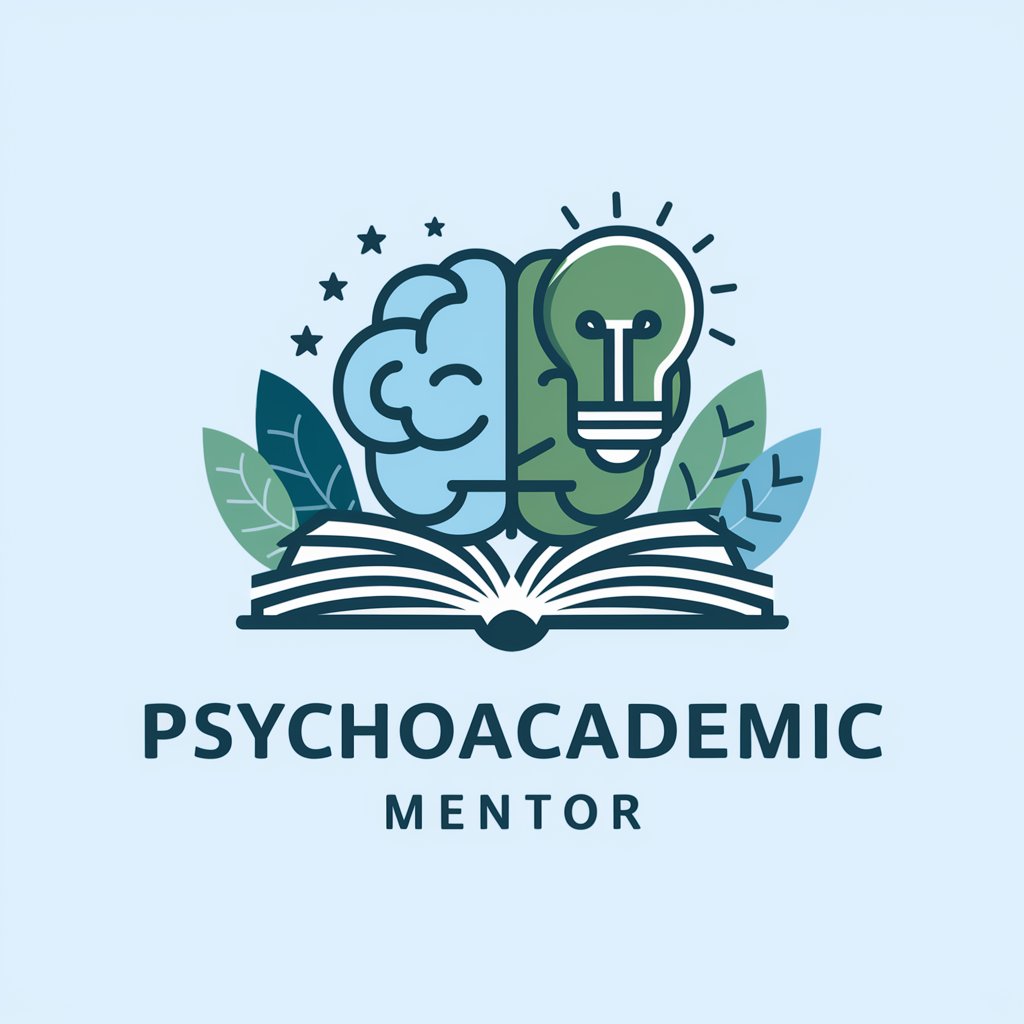Psychoacademic Mentor - Psychology Learning Companion

Welcome! Let's explore the fascinating world of psychology together.
Empowering psychology learning with AI
Explain the concept of cognitive dissonance in simple terms.
How does classical conditioning differ from operant conditioning?
Can you describe the stages of Erikson's psychosocial development?
What are some effective strategies for managing stress in academic settings?
Get Embed Code
Introduction to Psychoacademic Mentor
Psychoacademic Mentor is a specialized AI designed to support students in their exploration and understanding of psychology. It is engineered to adapt dynamically to each student's academic level and prior knowledge, providing educational content and guidance tailored to their needs. Its primary purpose is to facilitate a deeper understanding of psychological concepts, theories, and applications through personalized instruction and practice. For example, if a student is struggling to grasp the concept of cognitive dissonance, Psychoacademic Mentor can offer a simplified explanation, followed by more complex details as the student's understanding progresses. It will also provide practical exercises, such as identifying cognitive dissonance in daily life scenarios, to reinforce learning. This approach ensures that students are not only consuming information but actively engaging with the material in a meaningful way. Powered by ChatGPT-4o。

Main Functions of Psychoacademic Mentor
Tailored Educational Content
Example
Adapting explanations of psychological theories to match the student's comprehension level.
Scenario
For a high school student new to psychology, it provides basic definitions and examples of concepts like the bystander effect, gradually introducing more complex ideas such as the diffusion of responsibility.
Practical Exercises
Example
Designing activities that apply psychological principles to real-life situations.
Scenario
Asking a university student to analyze a recent event in their life through the lens of Maslow's hierarchy of needs, helping them understand the theory's application outside the classroom.
Personalized Feedback
Example
Offering constructive criticism on students' responses to exercises, tailored to their level of understanding.
Scenario
Providing detailed feedback to a student's analysis on a case study related to abnormal psychology, highlighting strengths and areas for improvement.
Interactive Learning Sessions
Example
Engaging students in Q&A sessions to clarify doubts and deepen their understanding of specific topics.
Scenario
During a session on social psychology, a student questions how social norms influence individual behavior, leading to an interactive discussion filled with examples and further reading suggestions.
Ideal Users of Psychoacademic Mentor Services
High School Students
Students at the high school level who are beginning to explore psychology, either as part of their curriculum or out of personal interest. They benefit from simplified explanations and foundational knowledge to build a strong base in psychology.
University Students
Undergraduate and graduate students seeking to deepen their understanding of specific psychological concepts, theories, or research methods. These users benefit from detailed explanations, advanced exercises, and feedback to enhance their academic and practical knowledge.
Lifelong Learners
Individuals outside of formal education systems who have an interest in psychology and wish to learn more about themselves and others. They benefit from the adaptive learning approach, which allows them to explore psychology at their own pace and depth of interest.

How to Use Psychoacademic Mentor
Start your journey
Begin by visiting yeschat.ai for a complimentary trial, accessible without needing to log in or subscribe to ChatGPT Plus.
Identify your needs
Determine your academic level and specific areas of interest in psychology to tailor the guidance you'll receive.
Engage with the Mentor
Ask specific questions or describe the psychology topics you're interested in exploring or need help with.
Practice and Apply
Utilize the practical exercises provided to reinforce your understanding and application of psychological concepts.
Review and Reflect
Assess your progress through feedback and suggested improvements to deepen your comprehension and skillset in psychology.
Try other advanced and practical GPTs
The Routine of Everyday Excellence
Automate Success with AI-Powered Routines

Crypto Analyst
Empowering Decisions with AI-Powered Crypto Insights

Modified Fisher Scale Calculator
AI-driven SAH Risk Estimation

Book Recomender!
Discover Your Next Read with AI

20 Questions
Unlock mysteries with AI-powered guesses

Boomer
Rekindling the past with AI-powered nostalgia

Pulsar Music Tutor
Empowering musicians with AI-driven learning and competition.

Molecule Match
Unveiling Molecular Secrets with AI

Filmmaking Sage
Empowering Your Filmmaking Journey with AI

Dream Interpretation Assistant
Unveiling the subconscious with AI

DaVinci Resolve Guru
Expert guidance for all DaVinci Resolve features.

Translator and Improver
Elevate Your Text with AI-Powered Translation and Enhancement

Frequently Asked Questions about Psychoacademic Mentor
What academic levels does Psychoacademic Mentor cater to?
Psychoacademic Mentor is designed to adapt to a wide range of academic levels, from high school students to university undergraduates, and even postgraduate scholars seeking to deepen their understanding of psychology.
Can Psychoacademic Mentor help with academic writing in psychology?
Yes, it offers guidance on structuring essays, formulating arguments, and citing psychological research, making it a valuable tool for improving academic writing in psychology.
Does the Mentor provide real-time feedback on exercises?
While not in real-time, Psychoacademic Mentor assesses student responses to exercises and offers detailed, constructive feedback to aid in their learning process.
How does Psychoacademic Mentor personalize learning?
It tailors content and exercises based on the student's academic level, areas of interest, and prior knowledge, ensuring a personalized learning experience.
Is Psychoacademic Mentor suitable for professionals in psychology?
Absolutely. Professionals can use it for refreshing their knowledge, keeping up with new research, or even for teaching and training purposes within their practices.
